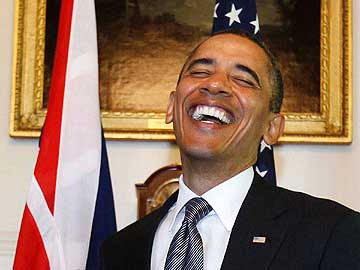(单词翻译:单击)
Laughter is weird - and we do it a lot. One study found that people laugh seven times for every 10 minutes of conversation.
笑很奇怪--而我们还经常这么做。一项研究发现,人们在每十分钟的交谈中平均会笑七次。
We don't do it when we think we do. It's been found that if you ask people what makes them laugh they'll talk about jokes and humour, but we laugh most frequently when we are with other people - and hardly ever at jokes.
有时我们以为自己在笑,而实际上并没有。如果你问人们什么会让他们大笑,他们会回答笑话或幽默,然而我们在与他人交往时笑得最多--而很少在听到笑话时大笑。
It's a social emotion and we use it to make and maintain social bonds.
笑是一种社会情感,我们靠它来制造和维系社会纽带。
We also make very strange noises when we laugh - from wheezes and squeaks to gasps and snorts - and each sound simply reflects the muscles in the chest squeezing out air from our ribcages under very high pressures.
我们大笑时还会发出奇怪的声音--从喘息和吱吱声到大喘气和哼哼--这些声音仅仅是胸部肌肉在高压作用下将胸腔空气排出造成。

My laugh is very high-pitched, far higher than I could produce when trying to sing, for example.
我的笑声非常尖锐,打个比方说,比我试着唱歌的声音要尖地多。
Laughter is also a very primitive way of making a sound.
大笑同时也是一种非常原始的发声方式。
MRI images show that when someone laughs, there is no real movement of the tongue, jaw, soft palate and lips. All the action is happening at the ribcage.
核磁共振图像显示,人们在大笑时,舌头、下巴、软腭和嘴唇并没有真正运动。所有的动作都在胸腔内发生。
Laughter is a non-verbal emotional expression and these sounds, which we typically make when in the grip of quite strong emotions, are more like animal calls than they are like our normal speech.
大笑是一种非语言的情感表达方式,当我们处在非常强烈的情绪中时,我们发出的声音更像动物的吼声而不像我们正常的语言交流。
We make them in very simple ways (unlike speech) and they are controlled by an evolutionarily "older" brain system, one that looks after vocalisation in all mammals (unlike speech).
我们发出这种声音的方式非常简单(不像语言),它们由进化角度“更老的”大脑系统控制,它在所有哺乳动物的发声系统中都存在(不像语言)。
This is why a stroke can rob someone of the ability to speak, but leave them able to laugh and cry. They have suffered damage to the brain areas that enable them to speak, but the older emotional system is still intact.
这就是为什么中风会使人失去语言能力,但患者仍能大哭和大笑。他们大脑中负责语言的部分受损,但更老的情绪系统部分仍然完好损。
These non-verbal expressions are frequently associated with expressions of emotion. The emotions themselves are called the "basic" ones, because they're recognised by all human groups and are also found in other mammals.
这种非语言的表达往往和情绪表达联系在一起。情绪本身被称为“基础”,因为它们会被所有人类群体和其他哺乳动物识别。
This explains why some emotions are quite similar across species - think about similarities between the face of an angry human and an angry wolf.
这也解释了为什么有些情绪跨越物种仍然十分相似--想想愤怒的人脸和愤怒的狼之间的相似之处吧。
People recognise laughter as laughter even if it is produced by someone from a very unfamiliar culture.
人们能够识别出笑声,即使它来自一个完全陌生的文化。
My collaborators Disa Sauter and Frank Eisner went to Namibia several times to work with the Himba people and the only positive sound that the English made which the Himba recognised (and vice versa) was laughter.
我的合作人迪萨·索特和弗兰克·艾斯纳多次前往纳米比亚和当地的津巴布韦人共事,他们唯一能够识别的由英语国家的人发出的积极声音就是笑声(反之亦然)。
Other, very positive emotions such as triumph, which are meaningful across cultures, are expressed very differently in different cultures and so are not basic expressions.
其他积极的情绪,比如胜利--在各文化中都是意义重大的,却有着不同的表达方式,因而它不是基础表情。
For example, in the UK, it's not unusual for people to cheer to express triumph, while the Himba people produce an almost song-like "ay-ay-ay" sound when they are celebrating.
例如在英国,人们在表达胜利时往往会欢呼,而津巴布韦人则是发出类似“ay-ay-ay”的声音来表达庆祝。
Of course, we are certainly not the only animals that laugh. Laughter has been well described in other primates such as gorillas, chimpanzees and orang-utans.
当然,人类并不是唯一会笑的动物。其他灵长类动物也能很好地大笑,比如大猩猩、黑猩猩和猩猩。
Laughter has even been described in rats, so it's at least possible that there is more laughter out there in the mammal kingdom.
甚至老鼠也会笑,因此在哺乳动物的世界里很可能存在更多会笑的动物。
And intriguingly, wherever you find laughter, its roots are in tickling and play from humans to gorillas to rats. All mammals play when they are juveniles and some mammals (like humans, otters, rats and dogs) play through their whole lives.
有趣的是,大笑往往来源于挠痒痒和玩耍,不论是人类、大猩猩还是老鼠。所有哺乳动物在青少年时期都会玩耍,有些哺乳动物(如人类、水獭、老鼠和狗)会把玩耍贯穿整个生命。
Maybe laughter has evolved to be an important signifier of play - a sign that we're having fun, no-one is going to get hurt and this is all a game.
也许,笑已经逐渐转变为玩耍的一个重要标记--它意味着我们很开心,没有人会受伤害,这只是个游戏。
There is even a theory that this is what happens in comedy - people are using communication in a playful way and this is why we laugh.
它甚至成为解释喜剧的一个理论--人们使用有趣的方式进行对话,这也是我们会笑的原因。


